Bear with each other and forgive whatever grievances you may have against one another.
Forgive as the Lord forgave you. (Colossians 3:13 )
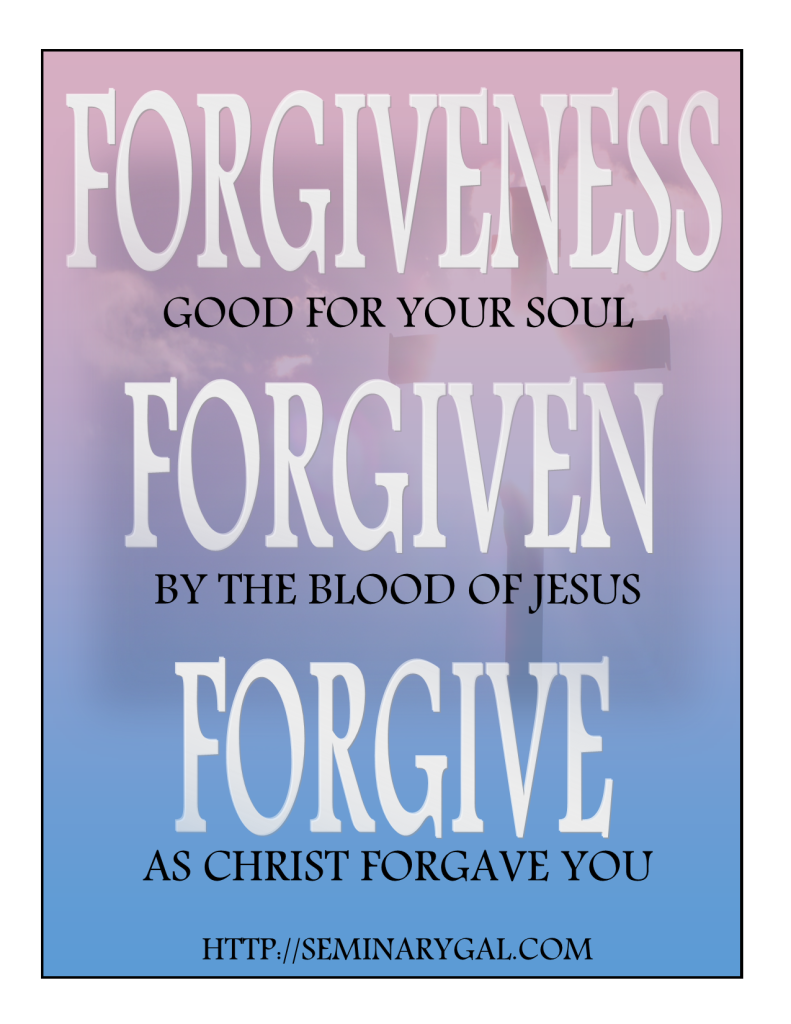
Making the Theological Understandable
Bear with each other and forgive whatever grievances you may have against one another.
Forgive as the Lord forgave you. (Colossians 3:13 )

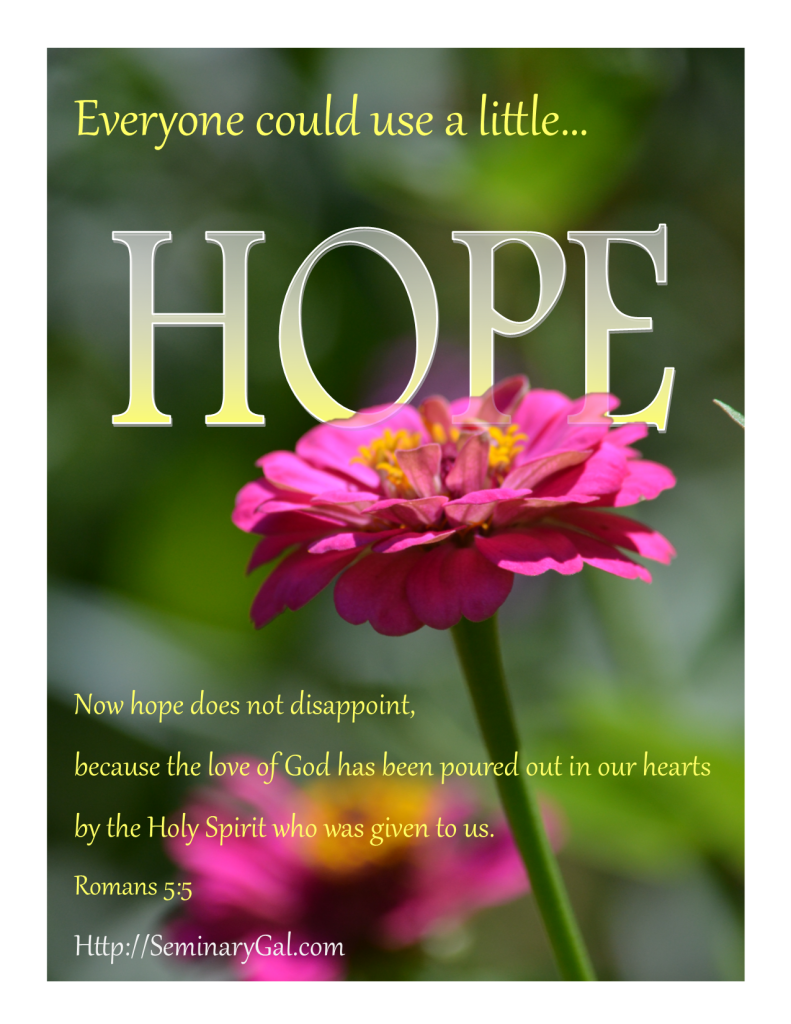
Anniversaries and milestones ought to elicit in us an appropriate response of gratitude.
It should be the posture of every Overcomer.
Luke 17: 11 Now on his way to Jerusalem, Jesus traveled along the border between Samaria and Galilee. 12 As he was going into a village, ten men who had leprosy met him. They stood at a distance 13 and called out in a loud voice, “Jesus, Master, have pity on us!” 14 When he saw them, he said, “Go, show yourselves to the priests.” And as they went, they were cleansed. 15 One of them, when he saw he was healed, came back, praising God in a loud voice. 16 He threw himself at Jesus’ feet and thanked him– and he was a Samaritan. 17 Jesus asked, “Were not all ten cleansed? Where are the other nine? 18 Was no one found to return and give praise to God except this foreigner?” 19 Then he said to him, “Rise and go; your faith has made you well.”
God is not obligated to heal any of us. Even those who are not healed here on this earth can yet receive eternal healing by their faith making them well. It is with humble gratitude that I give thanks to the LORD for an act of healing 10 years ago and the blessing of work to do. Mostly though, I thank Him for the work He did so that eternity is a place of no more crying or pain…no more diseases…no more cancer…no more death…and that by faith in Jesus, we will live to experience this heaven forevermore.
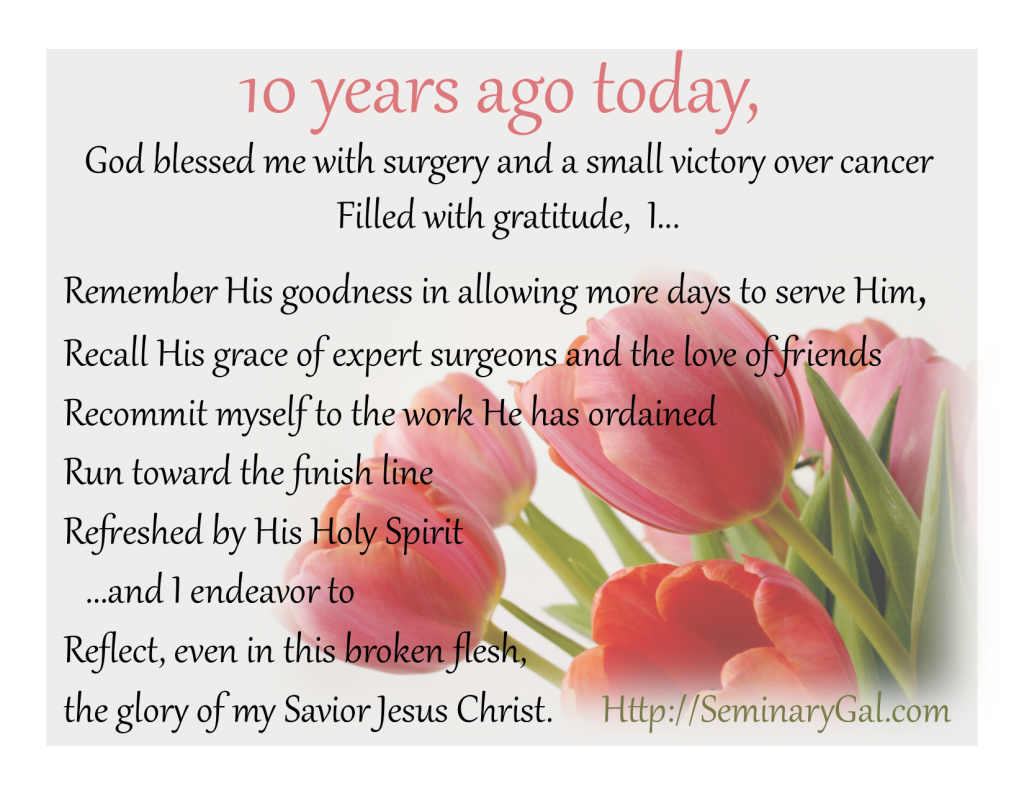
According to numerous sources, the “Peace Prayer of St. Francis” famously attributed to St. Francis of Assisi was not written by him. However, the message contained in this prayer reflects the genuine humility and compassion of St. Francis. It’s a good prayer for us today.
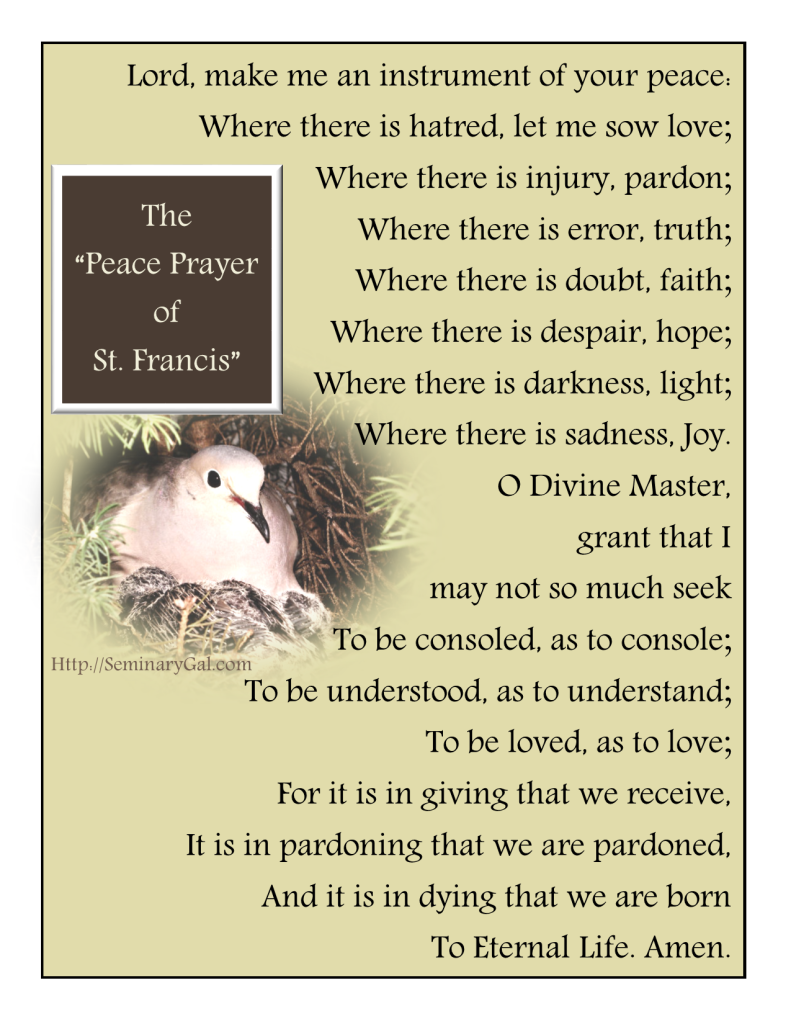
I’m glad you all like the hymn series we’ve been doing lately. They minister to my soul as well. It also helps me to see how many Overcomers have been in this world. It’s kind of like what God says about our Christian faith:
Hebrews 12:1 Therefore, since we are surrounded by such a great cloud of witnesses, let us throw off everything that hinders and the sin that so easily entangles, and let us run with perseverance the race marked out for us. 2 Let us fix our eyes on Jesus, the author and perfecter of our faith, who for the joy set before him endured the cross, scorning its shame, and sat down at the right hand of the throne of God. 3 Consider him who endured such opposition from sinful men, so that you will not grow weary and lose heart.
The Christian life is difficult. But we can gain encouragement to keep the faith from saints and Overcomers who have gone before us.
Today, consider George Matheson who was blind and suffered from periods of mental suffering. Yet one of his hymns “O Love that Wilt Not Let Me Go” is one of the most beloved hymns of the Church. According to the cyberhymnal, Matheson said about this hymn:
My hymn was composed in the manse of Innelan [Argyleshire, Scotland] on the evening of the 6th of June, 1882, when I was 40 years of age. I was alone in the manse at that time. It was the night of my sister’s marriage, and the rest of the family were staying overnight in Glasgow. Something happened to me, which was known only to myself, and which caused me the most severe mental suffering. The hymn was the fruit of that suffering. It was the quickest bit of work I ever did in my life. I had the impression of having it dictated to me by some inward voice rather than of working it out myself. I am quite sure that the whole work was completed in five minutes, and equally sure that it never received at my hands any retouching or correction. I have no natural gift of rhythm. All the other verses I have ever written are manufactured articles; this came like a dayspring from on high.
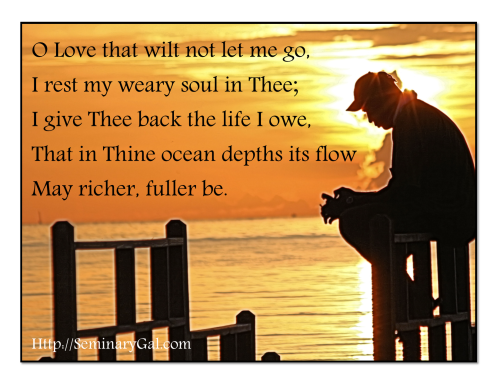
O Love that wilt not let me go,
I rest my weary soul in thee;
I give thee back the life I owe,
That in thine ocean depths its flow
May richer, fuller be.
O light that followest all my way,
I yield my flickering torch to thee;
My heart restores its borrowed ray,
That in thy sunshine’s blaze its day
May brighter, fairer be.
O Joy that seekest me through pain,
I cannot close my heart to thee;
I trace the rainbow through the rain,
And feel the promise is not vain,
That morn shall tearless be.
O Cross that liftest up my head,
I dare not ask to fly from thee;
I lay in dust life’s glory dead,
And from the ground there blossoms red
Life that shall endless be.
The hymn “Joyful, Joyful, We Adore Thee” is actually a well-known classical composition by Ludwig van Beethoven (1770–1827) arranged with hymn lyrics.
The lyrics were written in 1907 by Henry J. van Dyke. About the lyrics, he wrote:
These verses are simple expressions of common Christian feelings and desires in this present time—hymns of today that may be sung together by people who know the thought of the age, and are not afraid that any truth of science will destroy religion, or any revolution on earth overthrow the kingdom of heaven. Therefore this is a hymn of trust and joy and hope.
This is the light in which I include “Joyful, Joyful” in Overcomer’s Week. Opposition to the Christian worldview can seem to come in the form of scientific discoveries or political realities, but the true Overcomer sees all of this in light of the Kingdom. We need neither to hide from these realities nor to fear them. We trust in God. We remain joyful in hope; patient in affliction; and faithful in prayer (Romans 12:12).
It is fitting, therefore, that Edward Hodges adapted Beethoven’s beautiful Symphony No. 9 in D minor, Op. 125, specifically the “Ode to Joy” to form the musical accompaniment to these van Dyke lyrics of hopeful joy. The original lyrics to “Ode to Joy” were from a poem by Friedrich Schiller on the universal brotherhood of man under a benevolent Creator.
But what’s beyond remarkable was the way in which this lovely symphony was composed by another Overcomer. Beethoven began to lose his hearing in 1796, at around age 26. By the time he composed Symphony No. 9 in D minor, Op. 125, he was completely deaf. Many music critics believe this final complete Beethoven symphony to represent the pinnacle of his symphonic achievements. Others believe that is too little praise for a work such as this. They consider “The Symphony of Joy” or simply “The Chorale” to be the greatest musical piece of all time.
Hymn or poem, set to the loveliest classical composition, it is among my favorites written by Overcomers.
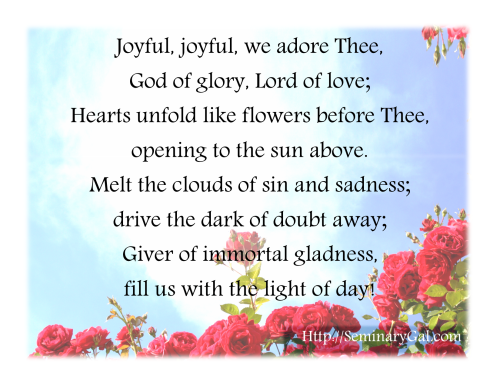
Joyful, joyful, we adore Thee, God of glory, Lord of love;
Hearts unfold like flowers before Thee, opening to the sun above.
Melt the clouds of sin and sadness; drive the dark of doubt away;
Giver of immortal gladness, fill us with the light of day!
All Thy works with joy surround Thee, earth and heaven reflect Thy rays,
Stars and angels sing around Thee, center of unbroken praise.
Field and forest, vale and mountain, flowery meadow, flashing sea,
Singing bird and flowing fountain call us to rejoice in Thee.
Thou art giving and forgiving, ever blessing, ever blessed,
Wellspring of the joy of living, ocean depth of happy rest!
Thou our Father, Christ our Brother, all who live in love are Thine;
Teach us how to love each other, lift us to the joy divine.
Mortals, join the happy chorus, which the morning stars began;
Father love is reigning o’er us, brother love binds man to man.
Ever singing, march we onward, victors in the midst of strife,
Joyful music leads us Sunward in the triumph song of life.
If we’re going to talk about overcomers, let’s not forget William Walford who penned “Sweet Hour of Prayer”.
Christianity.com records his story this way:
William Walford was blind, but this did not make him worthless. On the contrary, as he sat by the fire in his English home in the mid-nineteenth century, his hands kept busy, whittling out useful objects, such as shoehorns. His mind was active, too.
Called on to preach from time to time in a rural English church, he composed sermons in his head to deliver on Sundays. He memorized a huge amount of the Bible which he quoted verbatim in his sermons. Some of his folk thought he had memorized the entire Scripture, cover to cover. William also composed lines of verse. And he prayed.
Thomas Salmon, a New York native, spent some time in Coleshill, Warwickshire, England, where he became acquainted with William. He tells this tale of what happened one day, while he was visiting the blind pastor:
“…He repeated two or three pieces which he had composed, and having no friend at home to commit them to paper, he had laid them up in the storehouse within. “How will this do?” asked he, as he repeated the following lines, with a complacent smile touched with some light lines of fear lest he subject himself to criticism. I rapidly copied the lines with my pencil, as he uttered them, and sent them for insertion in the Observer, if you should think them worthy of preservation.”
The Observer did consider them worth preserving, and they were published on this day, September 13, 1845, becoming a beloved hymn.
Sometimes those with the most to overcome have a connection to the spiritual realm in ways that people with more distractions and fewer genuine concerns do not. Imagine what the Scriptures would be like had there been no lame or blind or mute to heal.
John 9:1 As [Jesus] went along, he saw a man blind from birth. 2 His disciples asked him, “Rabbi, who sinned, this man or his parents, that he was born blind?” 3 “Neither this man nor his parents sinned,” said Jesus, “but this happened so that the work of God might be displayed in his life.”
Sweet Hour of Prayer is such a beautiful hymn–a work of God in the life of a blind man.
Sweet hour of prayer! sweet hour of prayer! That calls me from a world of care, And bids me at my Father’s throne Make all my wants and wishes known. In seasons of distress and grief, My soul has often found relief And oft escaped the tempter’s snare By thy return, sweet hour of prayer!
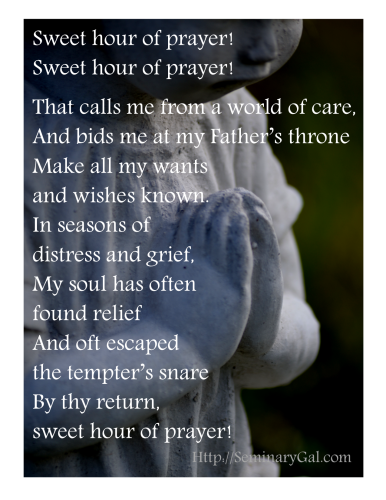
Sweet hour of prayer! sweet hour of prayer! The joys I feel, the bliss I share, Of those whose anxious spirits burn With strong desires for thy return! With such I hasten to the place Where God my Savior shows His face, And gladly take my station there, And wait for thee, sweet hour of prayer!
Sweet hour of prayer! sweet hour of prayer! Thy wings shall my petition bear To Him whose truth and faithfulness Engage the waiting soul to bless. And since He bids me seek His face, Believe His Word and trust His grace, I’ll cast on Him my every care, And wait for thee, sweet hour of prayer!
Sweet hour of prayer! sweet hour of prayer! May I thy consolation share, Till, from Mount Pisgah’s lofty height, I view my home and take my flight: This robe of flesh I’ll drop and rise To seize the everlasting prize; And shout, while passing through the air, “Farewell, farewell, sweet hour of prayer!”
As the next installment in my personal calendar’s Overcomer’s Week, I offer “Swing Low, Sweet Chariot.” The Encyclopedia of Oklahoma History and Culture recounts the story of how Wallis Willis (Uncle Wallace), a Choctaw freedman, and his wife (Aunt Minerva) came to have their “Swing Low, Sweet Chariot” transcribed as a hymn. Slaves and former slaves certainly had their share of overcoming to do. This historic Spiritual is widely thought to refer not only to the prophet Elijah’s being taken up into heaven by a chariot (2 Kings 2:11), but also to the Underground Railroad, the resistance movement helping many slaves overcome as they escaped from the South to the North (and Canada).
Wallis Willis composed other “plantation songs” as well. “Steal Away to Jesus” obviously speaking of going home to Jesus at the trumpet sound, but is also thought to refer to the Underground Railroad. Both were popularized by the Jubilee Singers from Fisk University who were raising funds for education among the Choctaw freedmen.
Music has a way of encouraging us as we persevere. Enjoy this version of “Swing Low, Sweet Chariot” sung by Kathleen Battle and the Boys Choir of Harlem.
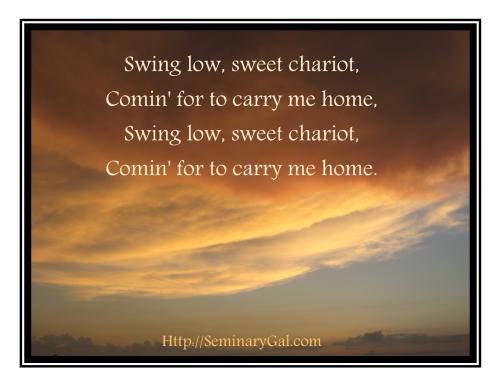
Well, I looked over Jordan and what did I see, Comin’ for to carry me home, A band of angels comin’ after me, Comin’ for to carry me home.
Chorus: Swing low, sweet chariot, Comin’ for to carry me home, Swing low, sweet chariot, Comin’ for to carry me home.
Well, If you get there before I do, Comin’ for to carry me home, Tell all of my friends that I’m a-comin’ too, I’m comin’ for to carry me home. Chorus.
As you’ll soon be able to tell, I am embarking upon my unofficial “Overcomer’s Week.” It’s not on everyone’s wall calendar, but it sure is on my personal calendar these days. I cannot tell you how many people have recently asked me how I overcome disappointments, anger, stereotypes, etc. without giving in to the temptations to throw in the towel. I’m presently in the process of writing an article on overcoming difficulties by the Gospel, and I’m finding inspiration–not only in Scripture–but in classic hymns like “Just as I Am.” (click to listen).
The hymn’s writer, Charlotte Elliot, became an invalid at the age of 19. Joni Eareckson Tada tells the following story:
Charlotte Elliot had a severe illness early on in life which left her in great pain and often bedridden. As a young girl, she often became frustrated with her disability, and she would lament that her physical problems left her so out of sorts and irritable. When a visiting preacher shared the Gospel with her, she replied, “Oh, that’s not for me; I’m not worthy; I’m not a very pleasant person.” But the preacher told her, “Oh, Charlotte you should come just as you are.” “Just as I am?” she asked, amazed, which is why, after she opened her heart to Christ, one of the first hymns she wrote was, “Just as I Am.”
So at the age of 32, Charlotte wrote “Just As I Am” as she wrestled with her feelings about the Christian faith in light of her infirmity. William B. Bradbury set the lyrics to music and the hymn was published in 1849. This popular hymn has been translated into many different languages and is frequently played at revivals and crusades during which time many thousands of people have committed their lives to Jesus Christ. Not a bad legacy for a woman who spent the majority of her life suffering.
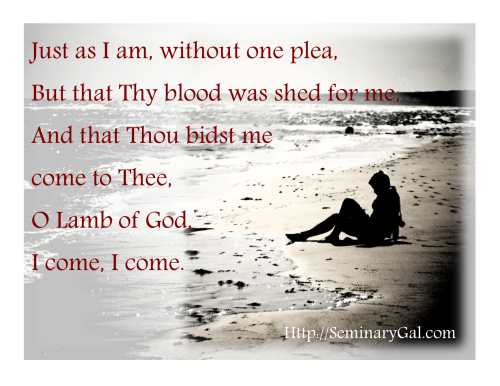
Just as I am, without one plea, But that Thy blood was shed for me, And that Thou bidst me come to Thee, O Lamb of God, I come, I come.
Just as I am, and waiting not To rid my soul of one dark blot, To Thee whose blood can cleanse each spot, O Lamb of God, I come, I come.
Just as I am, though tossed about With many a conflict, many a doubt, Fightings and fears within, without, O Lamb of God, I come, I come.
Just as I am, poor, wretched, blind; Sight, riches, healing of the mind, Yea, all I need in Thee to find, O Lamb of God, I come, I come.
Just as I am, Thou wilt receive, Wilt welcome, pardon, cleanse, relieve; Because Thy promise I believe, O Lamb of God, I come, I come.
Just as I am, Thy love unknown Hath broken every barrier down; Now, to be Thine, yea, Thine alone, O Lamb of God, I come, I come.
Just as I am, of that free love The breadth, length, depth, and height to prove, Here for a season, then above, O Lamb of God, I come, I come!
The songwriter of Victory in Jesus, Eugene Monroe Bartlett, Sr., was born on Christmas Eve of 1885. At an early age, he received Jesus Christ as his Savior and as he grew, he came to know his calling to publish hymns and teach singers to sight read.
At the age of 36, he established the Hartford Music Institute which was a shape-note school for teaching music. (Shape notes—notes in which the heads were different shapes–were thought at the time to help with congregational singing in churches, particularly if music reading skills were limited).
Bartlett wrote many gospel music favorites which were performed and popularized by leading gospel quartets of their day, including several African-American gospel groups, something quite notable given the day in which Bartlett lived.
His commitment to nurturing the next generation of gospel songwriters and singers was evident in his sponsorship of emerging talent. One of the best known shape note Southern gospel songwriters–Albert E. Brumley—got his start at Bartlett’s Hartford school and was eventually employed by Hartford Music.
In 1939, Bartlett became partially paralyzed due to a stroke, making it impossible for him to continue to perform and travel. However, as is the case with so many people who are devoted to their calling, they rise above their circumstances to create a crowning achievement. Bartlett wrote his last work—and arguably his most beloved song– “Victory in Jesus” while paralyzed. Read the lyrics below in a new light, knowing this backstory. Or listen to the great George Beverly Shea singing this gospel classic by clicking here.
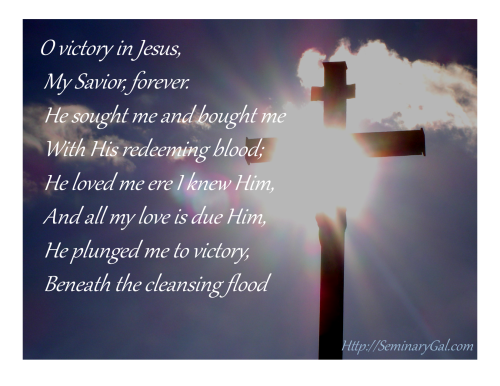
Victory in Jesus
I heard an old, old story,
How a Savior came from glory,
How He gave His life on Calvary
To save a wretch like me;
I heard about His groaning,
Of His precious blood’s atoning
Then I repented of my sins;
And won the victory.
Refrain: O victory in Jesus,
My Savior, forever.
He sought me and bought me
With His redeeming blood;
He loved me ere I knew Him,
And all my love is due Him,
He plunged me to victory,
Beneath the cleansing flood
I heard about His healing,
Of His cleansing power revealing.
How He made the lame to walk again
And caused the blind to see;
And then I cried, “Dear Jesus,
Come and heal my broken spirit,”
And somehow Jesus came and brought
To me the victory.
Refrain
I heard about a mansion
He has built for me in glory.
And I heard about the streets of gold
Beyond the crystal sea;
About the angels singing,
And the old redemption story,
And some sweet day I’ll sing up there
The song of victory.
Refrain